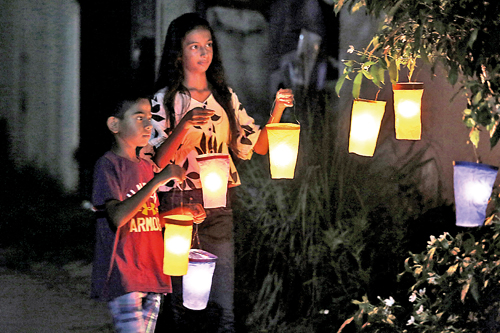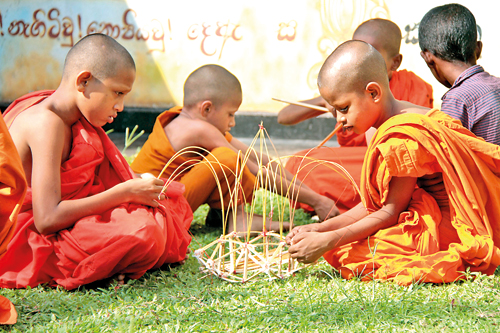Lockdown lit up by the true meaning of Vesak

Humble little clay lamps spread light: Residents of Valmailla, Bandaragama light pahan in front of the temple. Pix by Indika Handuwala
1955 was a landmark year for Ceylonese Buddhists. They had long been petitioning for Vesak to be made a public holiday. For five years committees had been fussing and pondering- till finally in Sir John Kotelawela’s last year of premiership the holiday was granted.
From that point on Vesak was to gather more dazzle- each year the pandals would vie with each other for size and pyrotechnics- and with the passage of time the Colombo gridlocks would grow bigger and bigger. Vesak zones would draw millions to the city- for a night’s heady entertainment and camaraderie amidst glaring lights and music meant for adulation of that most serene of beings- the Buddha.
If the whole point was being missed, few complained. It was all too easy to ignore the line between amisa pooja- material and hospitality offerings- and pratipatti pooja- worship by practising the word- by pointing out that the former was needed to foster shraddah- reverence or faith.
Throughout the island’s very chequered modern history, there was no year hitherto when Vesak celebrations were as silent and streets deserted as this year- which seems sad.
Yet, this Vesak is perhaps the best we have had since- maybe- the advent of electricity.
There are many reasons to go back to the old Vesak. All the bright lights are- if you look at it from the forest monk’s point of view- will o’ the wisps. Not only do they rob the serene beauty of the night, but also waylay the Buddhist from his spiritual goals.
Few today remember the simple joys of an old village Vesak. Irangani Serasinghe in her reminiscences recalls the “… quietness. When you travelled by car in the village, far away you could see rows of bucket lanterns like a necklace of jewels-… so serene and beautiful unlike the violent sights you get to see today.”

Bright and colourful : Children adorn their garden with a row of buckets in Gothatuwa. Pic by Lahiru Harshana
Few pause to think that all the significance and beauty of a lantern lies in the flame that lights it within- it alone is the pooja offered to the Buddha and it alone gives off that serene glow. The fancy concoction we take hours over matters very little. The humble little clay lamp has more beauty than the biggest pandal.
Few too think that the most ideal Vesak would be that of the forest monk- who after all leads the most ideal existence. Alone in his retreat in a forest cave, he looks up at the full moon and remembers the Great Teacher’s life- and practises meditation with Nirvana as his goal- the highest form of worship of the Buddha.
Soothing of the mind is at the heart of Vesak, and this is why members of the clergy as well as the Buddhist laity point out that this year would be the best to practise pratipatti pooja, or worshipping Buddha by practising his teaching.
Says the Ven. Dr. Daniyagama Ananda Thera of the Rangiri Dambulla Vihara:

Engrossed in their task: Young monks of Wikramashela Pirivena, Bandaragama make Vesak lanterns
“The meaning of Vesak lies in its spiritual strength. Looking back today, one wonders if we really celebrated Vesak in the past years. We were given to festivities and showy celebrations. This year, Vesak is on a low key than ever before- even counting last year when the Easter bombings had their sobering effect. No one in fact came to the temple this Vesak.
“But at the same time it has turned our homes into temples and we practise meditation, while observing dasa sil or the ten precepts. The electronic media has made this possible.”
Says K. Meegahakumbura, historian attached to the Dalada Maligawa:
“In the distant past there were no festivities for Vesak. It was all centered on the village temple. At the heart of Buddhism is ‘dana, seela, bhavana’- or giving, observing the ten precepts and meditation. Everyone made a point of practising them on this day. All the kings practised at least the eight precepts.
“It was later after colonial times that we were drawn to practices like making pandals and decorations, Bakti geetha based on Christmas carols, or sending cards. This unfortunately led to a materialistic approach to Vesak. But this year, nature has made us return to the basics- celebrate in a simple, modest and meaningful way.”



